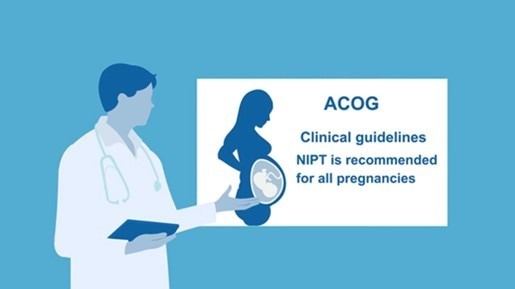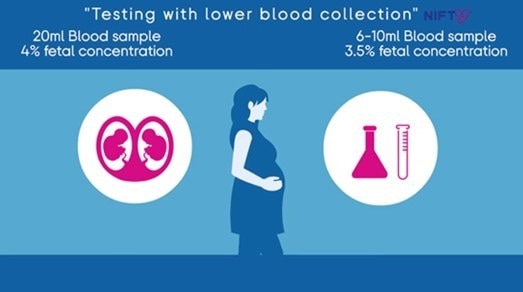The birth of every new life is to be celebrated! Expecting parents often advised by doctors from the department of gynecology and obstetrics to consider noninvasive prenatal tests (NIPT). Parents often have many questions with regard to the potential benefits of prenatal screening and making an informed choice to better understand the health status of the mother and baby. To assist in this process, BGI, one of the world’s leading providers of NIPTs, interview our in-house experts to answer these recurring questions.
Q1 What is NIPT? Why is NIPT considered a noninvasive test?
NIPT, also known as noninvasive prenatal screening (NIPS), is a screening test for evaluating the risk that the fetus will be born with certain genetic abnormalities or chromosomal disorders, such as Down syndrome (trisomy 21), Patau syndrome (trisomy 13), and Edwards syndrome (trisomy 18).
This testing analyzes small fragments of DNA that are circulating in a pregnant woman’s blood, which was called cell-free DNA (cfDNA). NIPT is considered noninvasive because it only requires drawing blood from the pregnant woman to test whether a fetus has a genetic condition and does not pose any risk to the fetus, giving expecting mothers the greatest peace of mind with a single blood draw.
Q2 Who should opt for NIPT?
The latest guidelines from the American College of Obstetricians and Gynecologists (ACOG) recommend that Non-Invasive Prenatal Testing (NIPT) be made available to all pregnant women, regardless of maternal age or baseline risk.
NIFTY – BGI’s NIPT solution – is suitable for most pregnant women from week 10 of pregnancy except for a few special cases. BGI is committed to serving more pregnant women with different reproductive backgrounds, such as singleton pregnancies, twin pregnancies, and in vitro fertilization (IVF) pregnancies.

The American College of Obstetricians and Gynecologist guidelines recommend NIPT for all pregnancies.
Q3 What conditions can NIPT screen for?
It's important to know that NIPT is a screening test — not a diagnostic test. This means that it can't diagnose a genetic condition with certainty. It can, however, predict whether the risk of a genetic condition is high or low.
NIFTY offers comprehensive prenatal screening options, including Trisomy 21, Trisomy 18, Trisomy 13, Sex Chromosome Aneuploidies (XO, XXY, XXX, XYY), Rare Autosome Aneuploidies (Trisomy 9, Trisomy 16, Trisomy 22), and other aneuploidies.
Q4 Can NIPT be extended to screen for a wider range of diseases?
BGI is working on improving screening technologies and decreasing costs of sequencing and analysis to significantly expand the scope of prenatal screening beyond common autosomal aneuploidies such as copy number variations (CNVs).
The number of copies of small sections of our genomes can have big consequences and evidence is accumulating that CNVs play important roles in human disease. NIFTY Pro can assess the risks of 84 types of CNVs now and we are working to expand the scope of CNV detection.

NIFTY offers testing with lower blood collection.
Q5 What is chorionic villus sampling (CVS) and amniocentesis?
CVS is a prenatal test in which a sample of chorionic villi is removed from the placenta for testing. The sample can be taken through the cervix or the abdominal wall.
Amniocentesis is a procedure in which amniotic fluid is removed from the uterus for testing or treatment. Amniotic fluid is the fluid that surrounds and protects a baby during pregnancy.
CVS and amniocentesis are diagnostic tests that can determine, with as much certainty as possible, whether a specific genetic disorder or condition is present in the fetus.
Both tests are invasive procedures carrying various risks to the expecting mothers and fetus including the risks of miscarriage, needle injury, infection, etc.
Q6 How is the expecting mother's privacy safeguarded?
The information and NIFTY test results of the patient are kept confidential and all data will remain anonymous during analysis. Only the patient’s healthcare provider will receive the test results.
BGI will retain personal data for no longer than necessary to provide these test services, please read the BGI Privacy Policy for additional details.
YouTube Video: NIPT provides non-invasive and thorough prenatal screening